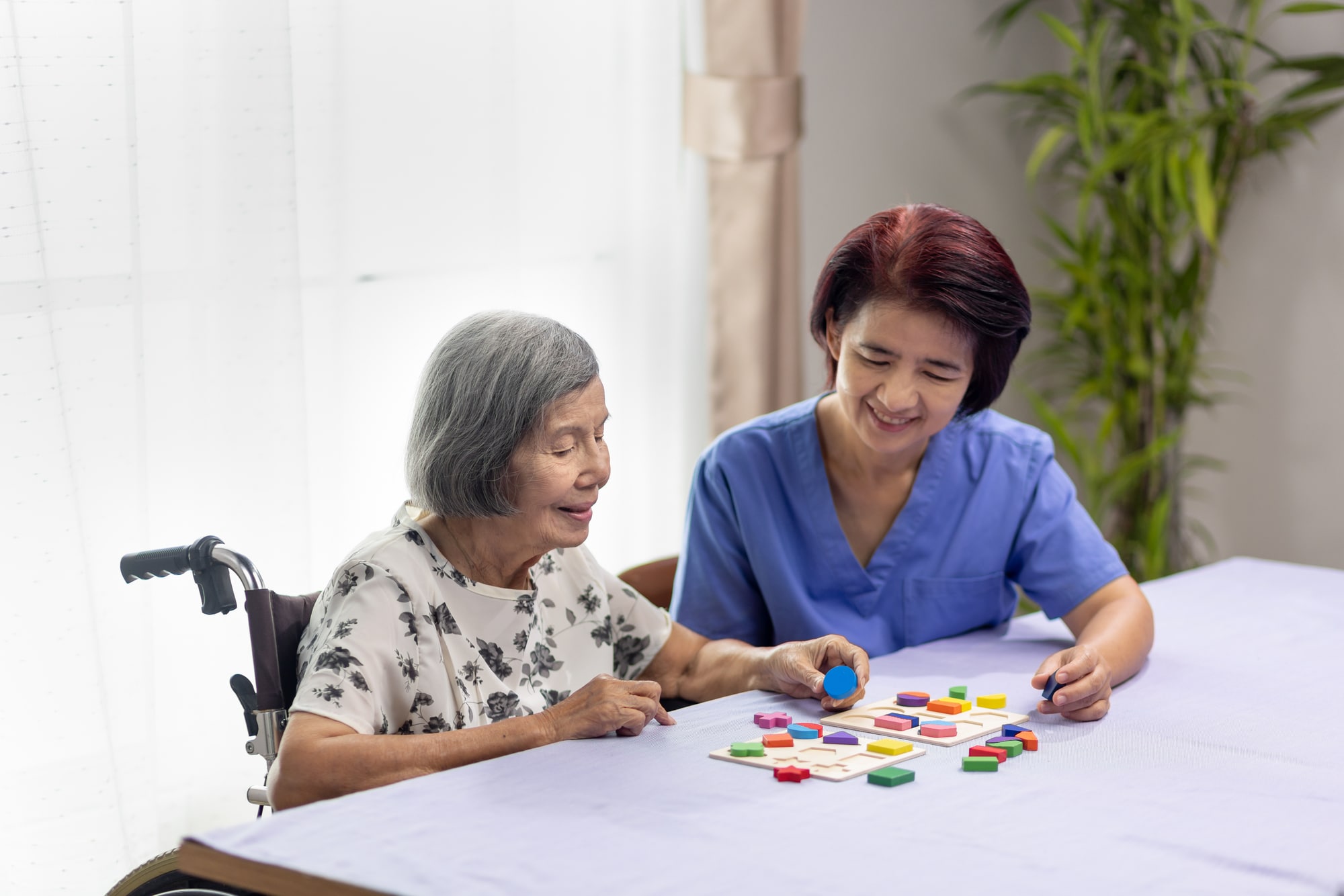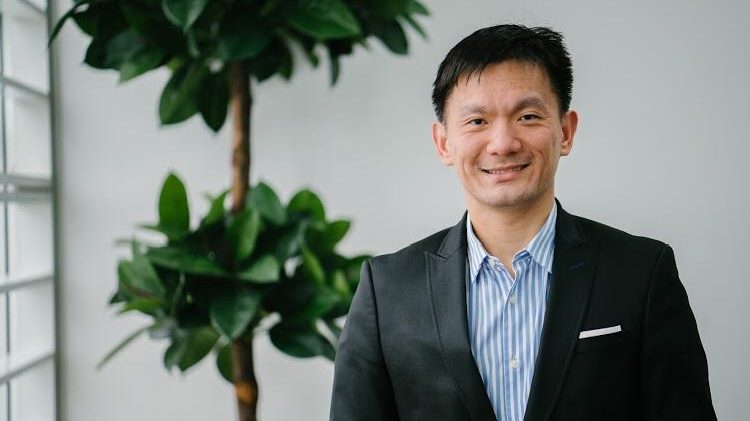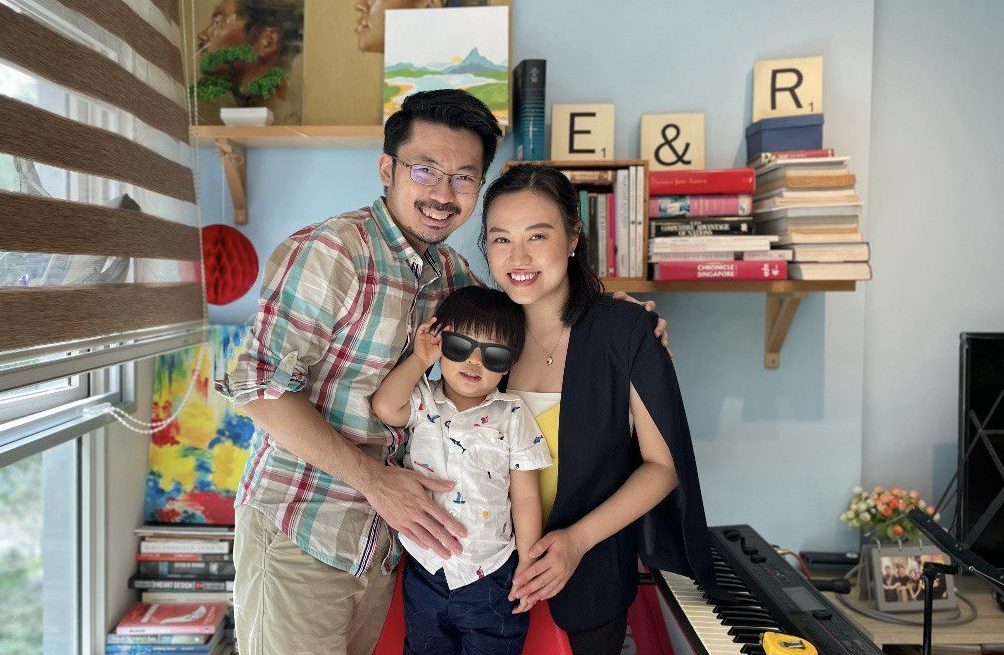“I hate you, Mum!” was an outburst that broke the chains of long-held resentment for ABS director Ong Ai Boon
by Janice Tai // September 21, 2023, 6:30 pm
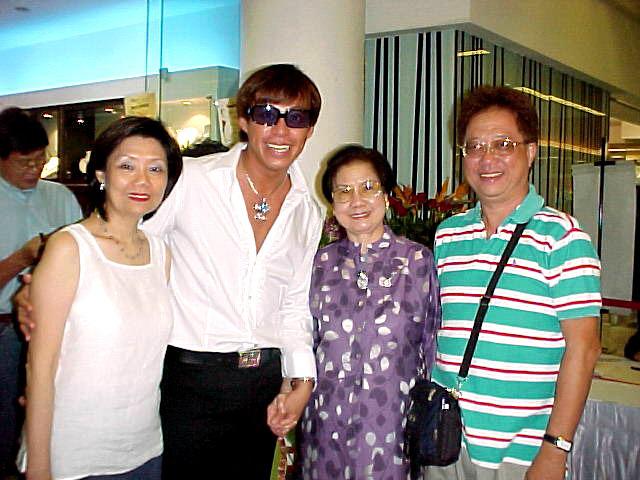
Smiles hid the tension that was never far from the surface between Ong Ai Boon (left) and her mother (third from left), pictured here flanking former DJ Dongfang Billy and her brother (far right).
Ong-Ang Ai Boon has been heading the Association of Banks in Singapore (ABS) for the last 40 years. At 77, she is still its director, leading the association to represent the interests of over 150 local and foreign banks in the financial industry, as well as working with regulators to establish a sound banking structure for Singapore.
Her recently launched book, “It’s Not Me”, chronicles the story of how the hand of God has guided her through the ups and downs of her professional and personal life.
Here is an excerpt from the book on how her relationship with her mother affected her leadership at work, as well as how her faith helped them to reconcile.
Over the years, I have gradually come to realise how profoundly my mother’s rejection of me had affected me.
Growing up, my demeanour was the exact opposite of my mother, a soft-spoken Teochew woman. She was gentle, sweet and full of self-control, while I was loud, domineering and had a hot temper like my father.
“If only you were more like me and not like your father” was her constant refrain to me.
“You already have three children but your behaviour still hasn’t changed one bit.”
We often did not see eye to eye, and quarrelsome clashes between us were common.
Even after I was married and had my own family, my bickering with my mother persisted. She continued to nag me, saying: “You already have three children but your behaviour still hasn’t changed one bit.”
Such comments — regularly dished out — may have been well-intentioned by those from the older generation, but they left me feeling deeply rejected and misunderstood.
Similarly, whenever my friends failed to see my point of view, I felt that they did not seek to understand me and I saw them as rejecting me.
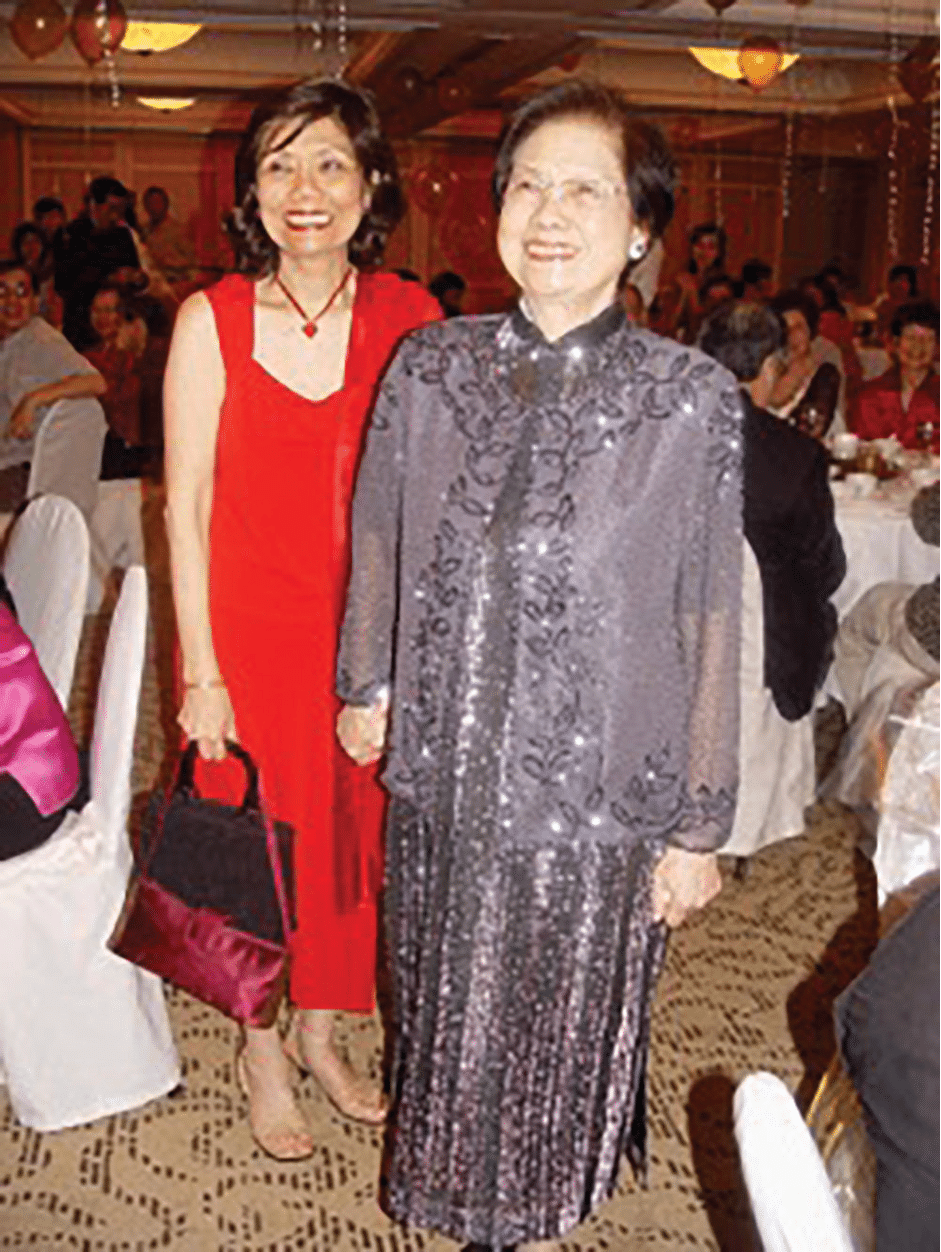
Every reason to celebrate: Ai Boon and her mother, Madam Sim, at the latter’s surprise 80th birthday party in 2005.
Rejection and projection
At work, it was clear to others that I did not like to be contradicted; I was seen to be unreceptive to new ideas and suggestions. That is, until the day I had an epiphany.
I was seen to be unreceptive to new ideas and suggestions. That is, until the day I had an epiphany.
My eyes were opened to the fact that the root of all this behaviour could likely be my mother’s rejection of me, and that my attitude towards the staff in the office was a result of my projecting her rejection of me into those situations.
After having such a key revelation, I began to do the necessary inner work to find healing and freedom.
One strategy helped me tremendously.
Whenever I began to react to any opposition to my suggestions, I would quietly, in my own mind, forgive my mother for not understanding me. That helped me become more open to other viewpoints and not take their rejection as a rejection of myself as a person.
Power dressing
I realised I was also shaped by my familial environment in other ways, including my love for dressing up.
I would not be caught dead wearing the same dress if that particular group of people had seen it before.
My mother was the quintessential Teochew wife — beautiful and demure. One of my younger sisters was so pretty that everyone around her dubbed her Lin Dai, a gorgeous and famous Hong Kong actress from the 1950s.
By comparison, I felt I was not much of a head-turner. However, I noticed that whenever I wore a new dress, people would compliment me. That not only motivated my desire to dress up, it also became an obsession.
I would buy new clothes every week, and always ensured that all my accessories were well matched with my attire. If I wore a nice dress for an occasion, it would be rare for me to wear it again. I would not be caught dead wearing the same dress if that particular group of people had seen it before.
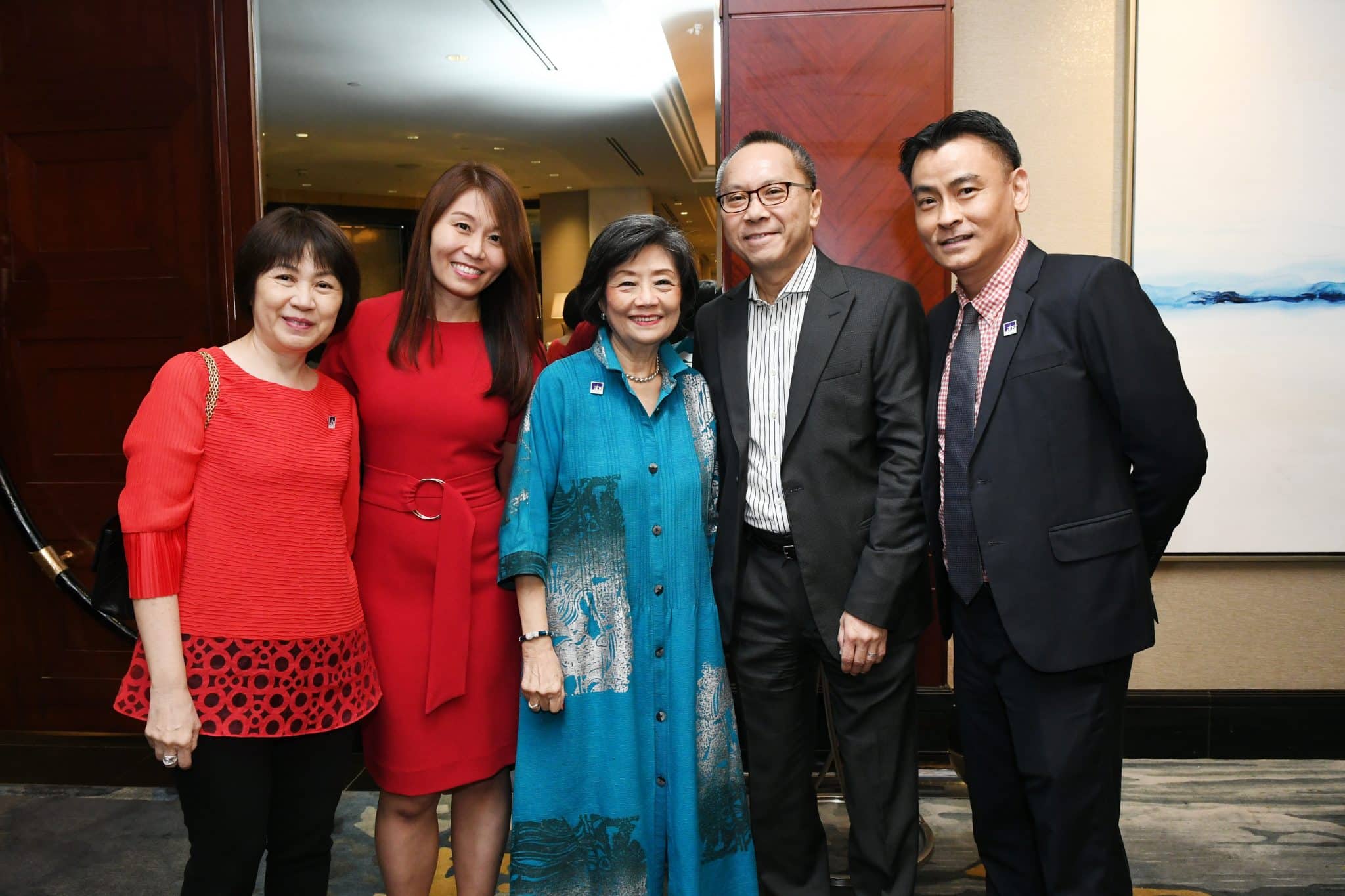
Beholding beauty: Ai Boon in an elegant blue dress at ABS’ Annual General Meeting.
In the banking industry, there are many women who dress stylishly in a way that makes them look both feminine and professional. We do need to dress well according to norms and occasions. However, there were times when I overdid it out of my own insecurities and a need for acceptance.
Stark naked
One sign that there was more to my need to dress up came via a vivid dream that I had in the mid-1980s.
In my dream, I was walking along North Bridge Road and Chinatown (where I grew up) with two senior ABS officers, my deputy Lucy Kwok and Diane Chai.
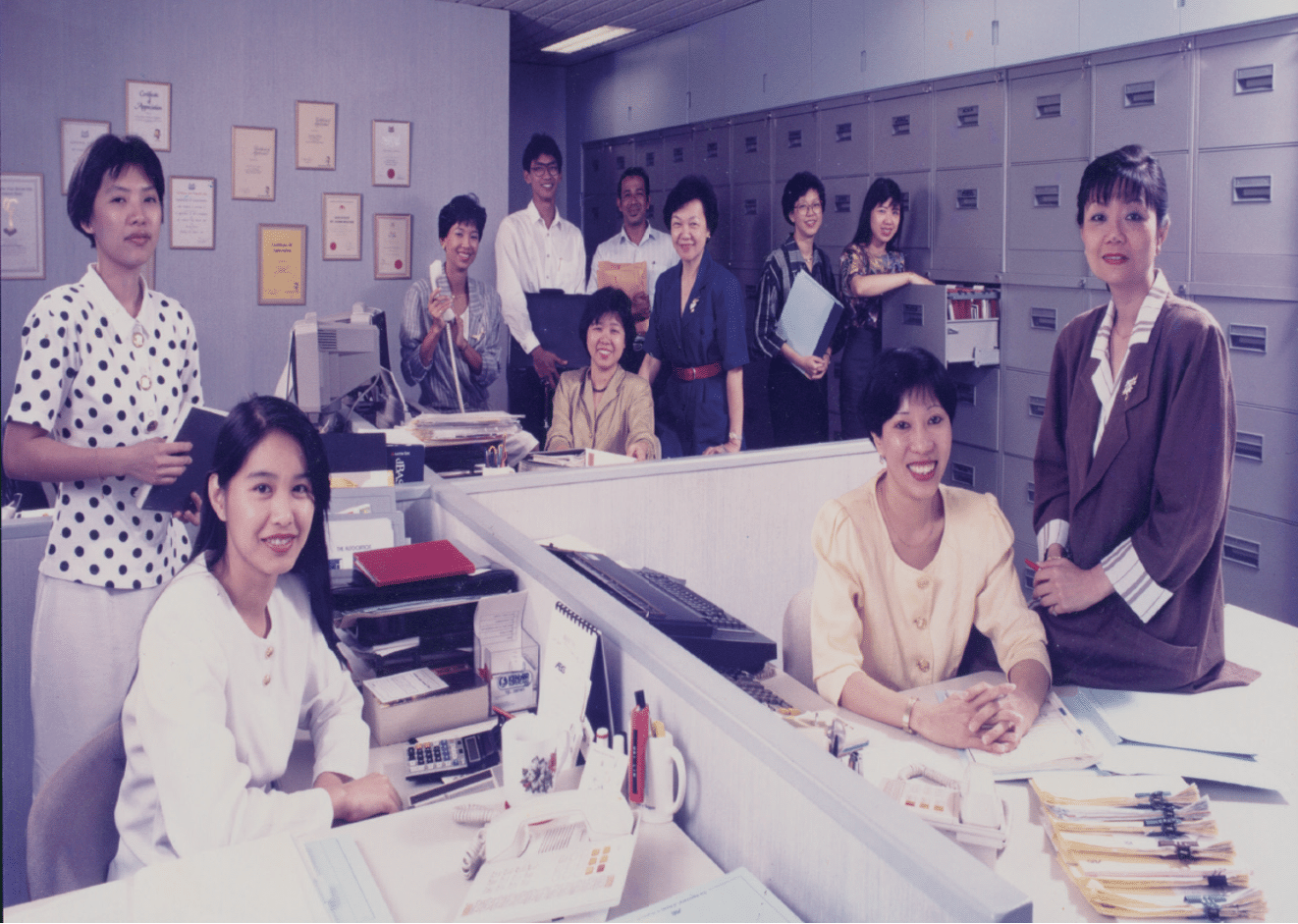
Business as usual: Ai Boon (extreme right) with the lean ABS team (including Diane Chai holding the telephone and Lucy Kwok (in blue) at the office in the MAS building in the late 1980s.
As we turned into Upper Cross Street, I noticed that the corner shop was a textile retailer. The shop displayed bales of cloth next to a long, standing mirror.
When I looked into the mirror, I saw, to my horror, that I was naked.
When I looked into the mirror, I saw, to my horror, that I was naked.
Immediately, I reached out for a bale of cloth and covered myself with it. I then turned to the two ABS officers in indignation and asked why they had not alerted me to my nakedness.
They did not reply me; one of them looked as if she had an answer but was holding her tongue.
When I related the dream to my husband, he alluded to my fierce nature by replying: “They would not dare to tell you the truth.”
Fig leaves
I saw the dream as God’s way of showing me the nakedness that I felt as I navigated life with feelings of guilt and shame of being ‘not enough’ — not good enough, not pretty enough and not smart enough.
As a result of low self-esteem and a lack of self-acceptance, I had been trying to clothe my nakedness with worldly cloth in seeking approval and attention through power dressing, and exerting a strong and dominating personality.
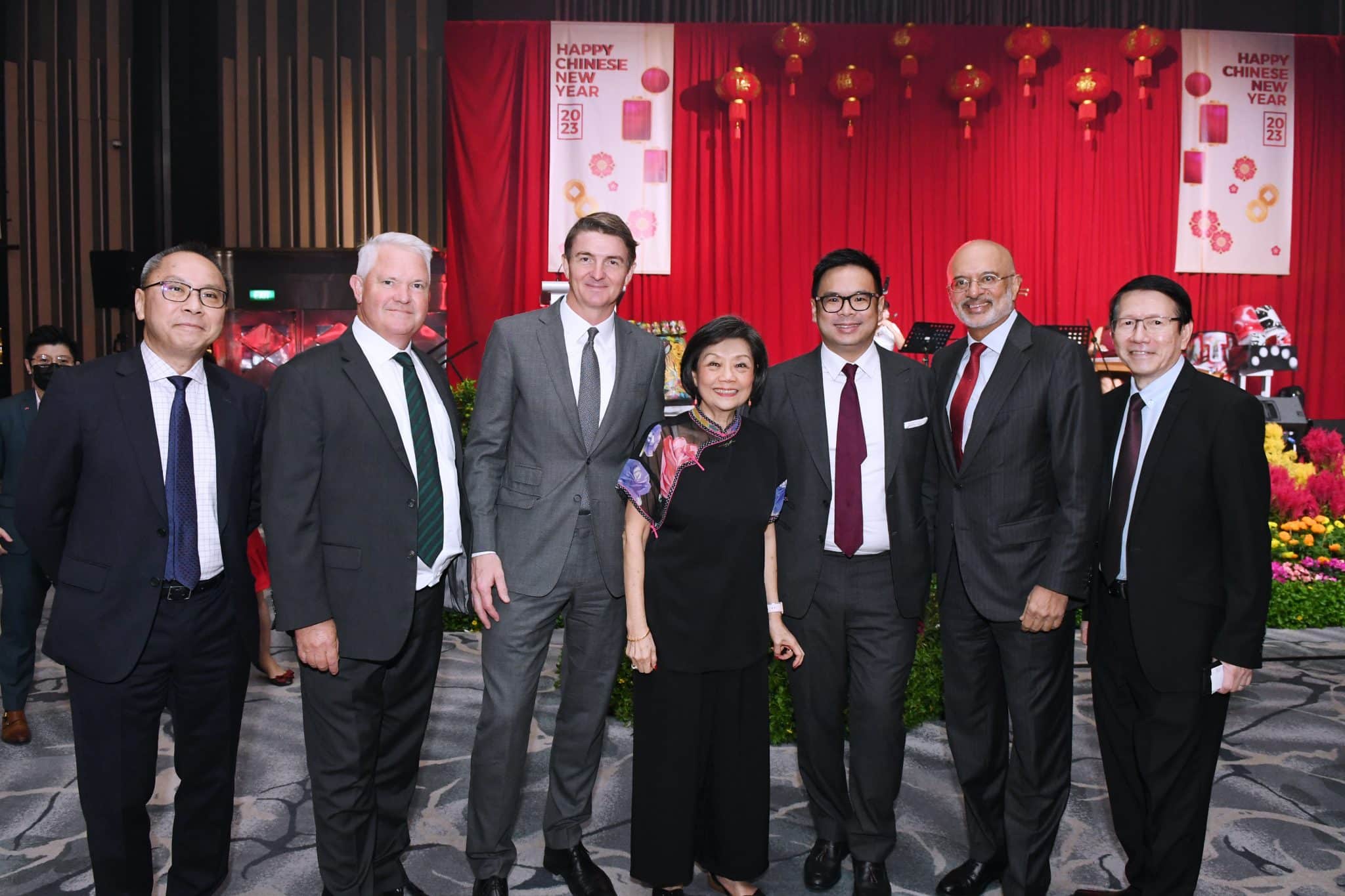
Outstanding: Ai Boon catching up with work partners at ABS lunar new year event.
The dream was my version of the story of Adam and Eve who used fig leaves to cover themselves up after they disobeyed God and found themselves naked. As God covered them with animal skins, I would later discover — when I became a Christian — that He has also given me the robe of a slain Saviour whose blood covers me.
Vanity fair
In the meantime, I saw myself like a crab, with a seemingly loud and confident armour as its exterior, but with a soft interior. Inwardly, I was quite diffident and emotionally fragile.
Ms Cindy Yim, an officer in MAS who once reported to me and is now a good friend, used to explain to others what I was like by saying: “Ai Boon is okay when you really get to know her. Don’t be afraid of her.”
I also used to tell my staff that my bark is worse than my bite. “At least you know where I am coming from as I would tell you things as they are, and not do you in from behind.”
Nonetheless, these should not be a vindication of my brusque behaviour.
As I went to God with this new level of awareness about myself, He gave me Isaiah 61:10, which spoke to me about God clothing me in a “robe of His righteousness”.
The Lord asked me: “Would this diamond cover your nakedness?”
Only God can provide such a robe. I can’t cover myself up with my effort or ability. I can’t work for it or buy it. I can only receive it by faith and through grace.
In 1998, I visited Israel for the first time with a group from my church. We visited a diamond factory and were enraptured by the stones. My husband saw me looking at a 1.3 carat solitaire and told me he would buy it for me if I really liked it.
As I contemplated this and was about to say “yes”, the Lord asked me: “Would this diamond cover your nakedness?” I did not buy it in the end. I learnt to focus less on earthly things and more on the things of God.
Thus, in spite of my vanity, I tried to put God first. When I was a new Christian, I asked the Lord if I needed to be less vain or be more modest in my dressing. He simply replied: “You can remain vain, but put Me first.”
I understood it to mean to seek Him and He would provide for all my needs. Practically, that also meant not stressing over the need to have new clothes or to coordinate my outfits with the correct accessories.
The first test in this area would come shortly after.
God winks
One morning, as I walked into office, I was greeted by my secretary Linda who remarked in horror: “Mrs Ong, you have a cocktail tonight!”
I was elated, not so much because of the compliment but by the fact that God had been true to His Word.
I immediately knew what she meant. Linda was asking why I was not dressed as formally and stylishly as I would normally be if I were going to a function straight after work.
I had forgotten about the work cocktail and my instinctive reaction was to go home and change.
In the split second when I was contemplating whether to head home, I heard God saying: “Put Me first.” I knew I had to obey His instruction and go as I was. So, I relaxed and continued with work until it was time to set off for the cocktail.
I was received at the event by one of the hosts, the former Managing Director of MAS, Mr Michael Wong Pakshong. Despite my simple dressing, the usually stoic Wong — who does not dispense compliments easily — said to me: “You look lovely tonight.”
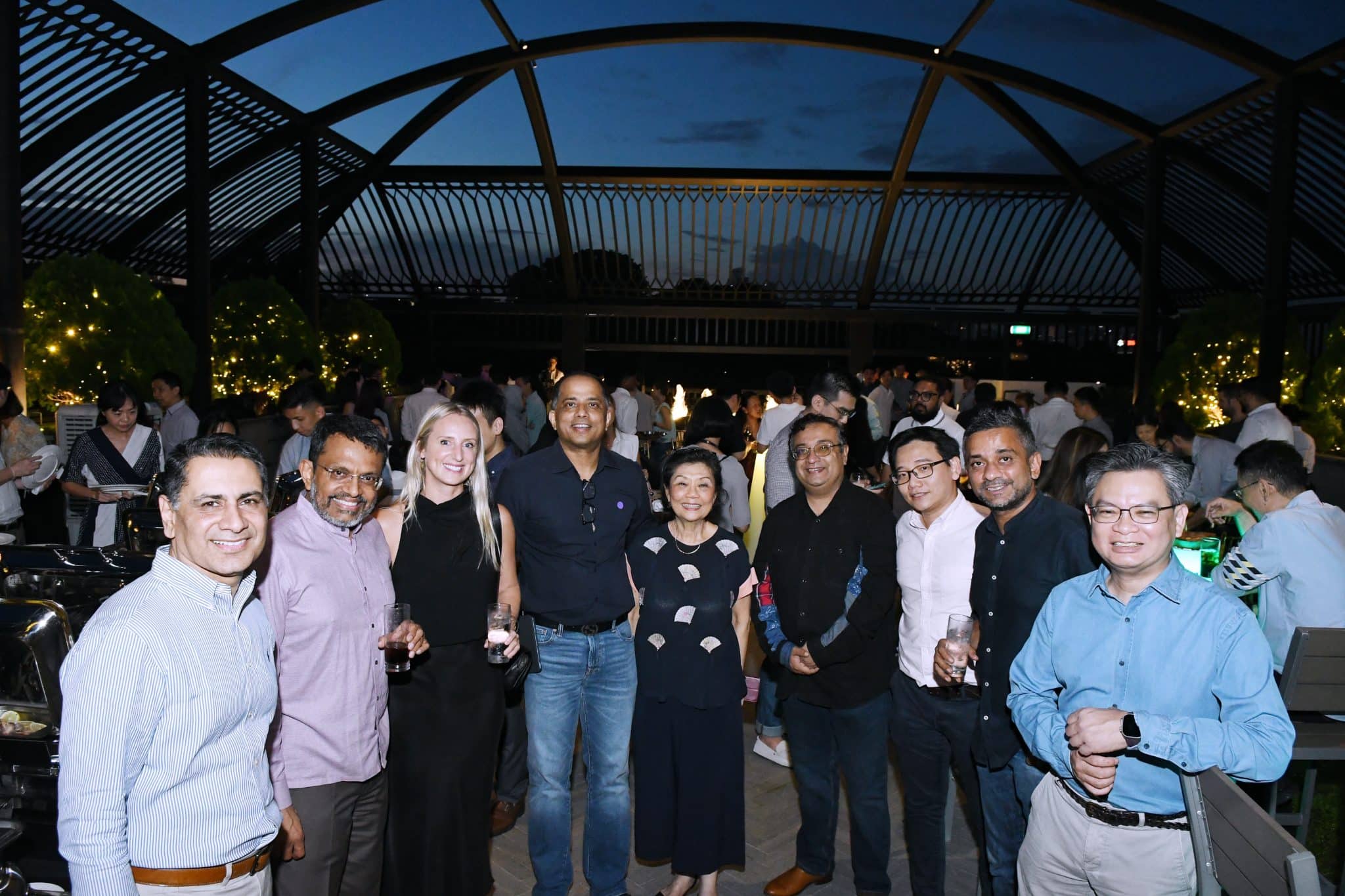
Never a dull moment: Ai Boon with work partners at the ABS-SFF (Singapore Fintech Festival) Appreciation Night 2022.
It seemed like God was winking at me through this curious episode.
I was elated, not so much because of the compliment but by the fact that God had been true to His Word.
It was a confirmation of the truth in His advice for me to put Him first and trust Him, instead of relying on my dressing. Perhaps there was a radiance about me when I learnt to relax, and I began to understand why my husband would say “beauty is skin deep” whenever I asked him for comments on how I looked in a particular outfit.
My aspiration later shifted from outward adornment to the hidden person of the heart instead, who in being quiet, gentle and reverent, is precious in the sight of God (1 Peter 3:3–4).
Inner healing
Due to the rejections I had received over the years, I realised I harboured a hardened heart — one that was unable to receive love, whether from God or people.
Yet as I reached out to God, He began healing my heart.
I felt loved when God not only understood me, but also when He helped my mother to understand me.
There was once when I had yet another heated argument with my mother, who by then had become a believer.
I was opposing her views by quoting Scripture and my mum retorted back in anger: “If a Christian acts like that, I don’t want to be a Christian.”
However, God later spoke to my mother during her quiet time to help her understand why I acted the way I did. He gave her Isaiah 66:2, and my mother realised that God “look(s) on with favour” at me because I “tremble at (His) word”.
When my mother told me how God explained my behaviour to her, I felt vindicated.
To me, to be loved is to be understood. I felt loved when God not only understood me, but also when He helped my mother to understand me.
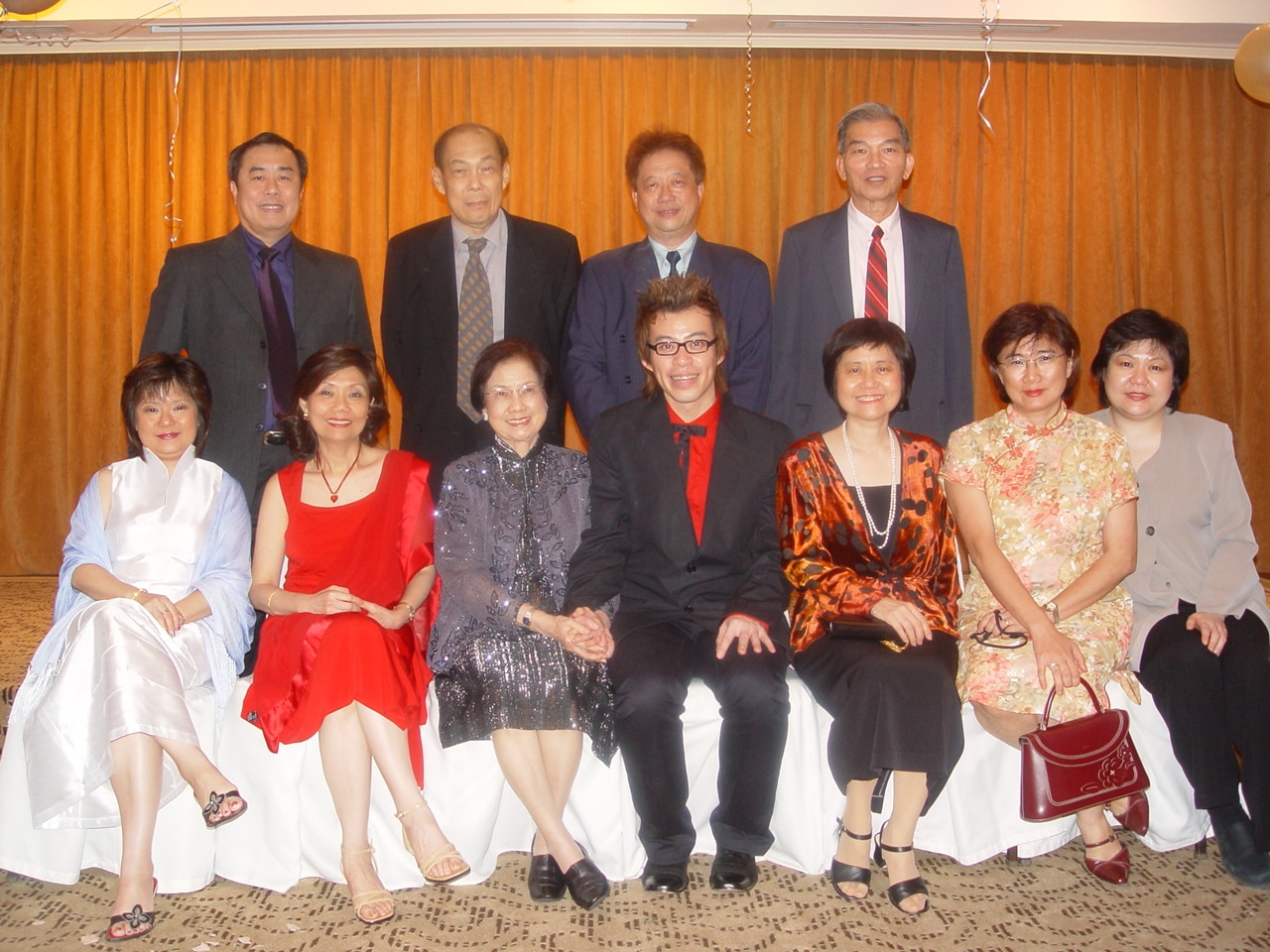
Family matters: The 80th birthday celebration of Ai Boon’s mother, Sim Soo Sim, in 2004, gathered Madam Sim’s children, their spouses and her godson, former Love 972 DJ Dongfang Billy.
My mother had received Christ a year after I became a Christian. We used to visit mediums together but she came to the faith after witnessing the change in me.
When she became a believer, she also changed radically.
Instead of lamenting to me the usual refrain of “Why can’t you be more like me?”, she instead asked God: “Lord, I want to be like my daughter.” She had seen me spending much time with God and she wanted to have the same degree of intimacy with Him.
Steady does it
Another time when I felt seen and known by God was when I was facing a major issue at work which could have potentially blown up very badly.
I was so stressed by it that I was not only unable to eat my dinner, the chopsticks I was holding were shaking vigorously from the trembling of my hand.
I left the dinner table for my bedroom and went on my knees to pray about the matter. Lo and behold, when I opened my Bible, it flipped open to Isaiah 44:8, which says: “Do not tremble, do not be afraid … You are my witnesses. Is there any God besides me?”
As I learnt how to receive love, giving and expressing love to others became much easier.
There I was trembling at dinner, and then I read a line that exhorts one not to tremble nor be afraid. I felt known, understood and loved by God. That’s how He softened and healed my heart bit by bit.
As I learnt how to receive love, giving and expressing love to others became much easier.
When my younger son, Tze Ru, was about eight years old, I was showering him when he innocently narrated to me the order of his affection towards everyone at home. His top favourite was his father, followed by Grandma, then Grandpa, his older brother and sister, our dog Royal and then, lastly, myself.
I knew he was just stating facts and I simply took it as a challenge to raise my position on his ‘totem pole’.
I knew I had succeeded partially when the boy matured into a teenager and professed that when he has his own house, he would want me to live with him. Who would have known then that his wish would come to pass eventually, though not according to our plan, when I moved in with his family later on under very different circumstances.
Truth unlocked
I was alone in my hotel room one night during a work trip to Sydney in the early 2000s when I began to be aware of an intense longing in my heart.
“Mum, I miss you, I need you,” I blurted out into the empty, still air before me.
There was no one there to hear these statements, honest and raw, but the act of speaking it out and hearing myself say it unlocked something within me.
I was then a middle-aged woman in my 50s, and it was the first time I was calling out for my mother, wanting her love.
I did not know the depth of my longing for her love, nor realised how much I loved her.
By then, I knew I harboured some resentment towards her for all those years of feeling misunderstood and rejected by her.
But I did not know the depth of my longing for her love, nor realised how much I loved her.
There is but a thin line between love and hate, as I would find out later.
When I first became a Christian in 1983, I was convicted to submit to God’s Word to honour my father and mother.
By then, my father had already died. We had a good relationship because I took after him; we both wore our hearts on our sleeves, liked to take charge of things and had a hot temper.
My mother was the opposite of us; she was a beautiful, gentle and submissive Teochew woman who often chastised me for my loudness and brashness. “If only you could be more like me, instead of your father,” she would bemoan.
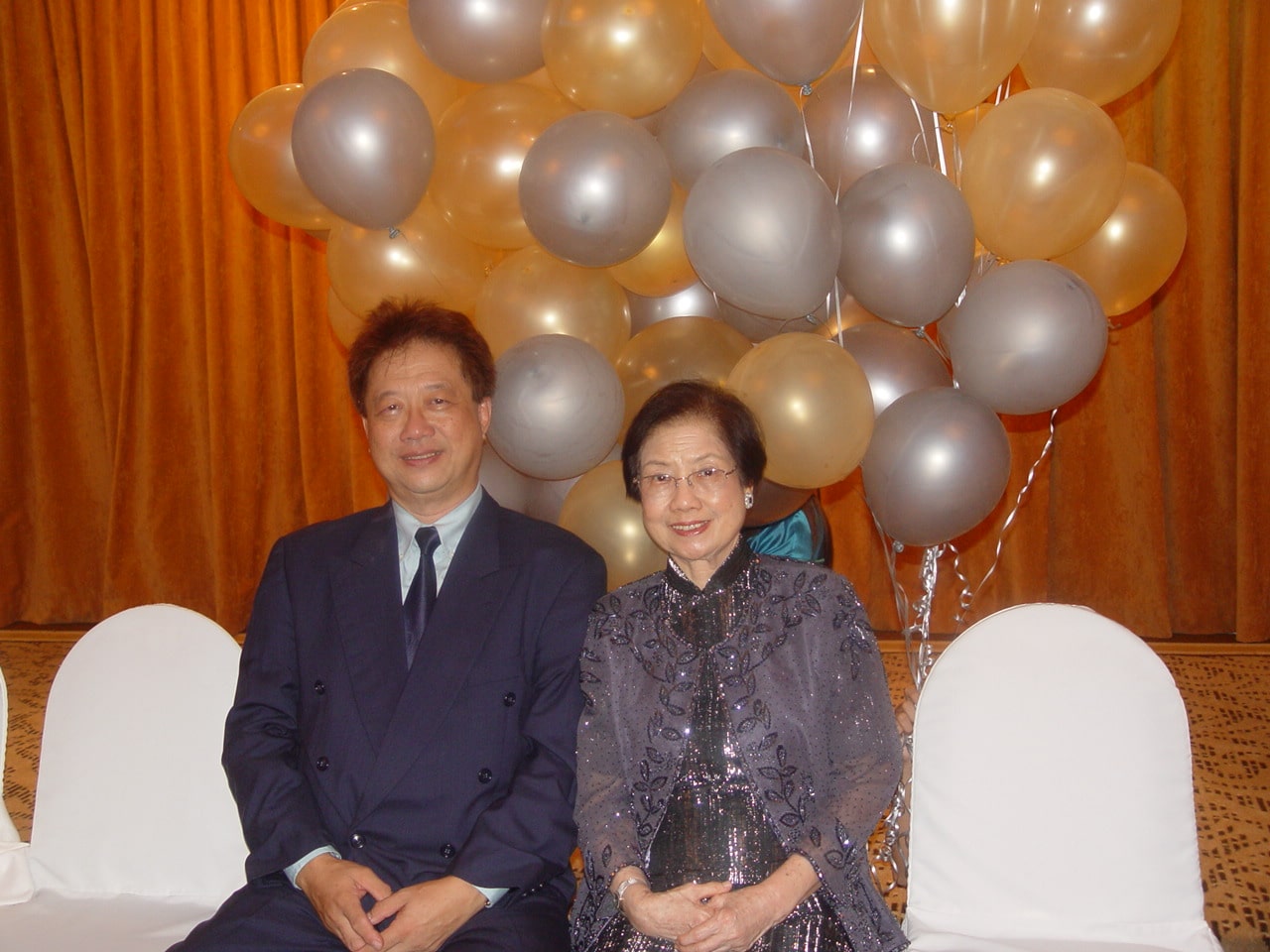
Ai Boon’s mother “favoured my two brothers over my sisters and me”: Pictured here is older brother, Robert, and Madam Sim.
Growing up, I also hated the fact that she favoured my two brothers over my sisters and me. The boys received most of her attention and they would get special food and attention that were not given to us.
Whenever I expressed strong opinions that she did not agree with, we would get into unpleasant clashes.
Even when we quarrelled, I hated the way she would not stand up to me and speak up.
I felt misunderstood and rejected by her, not only because we had vastly different personalities and ways of seeing things. Even when we quarrelled, I hated the way she would not stand up to me and speak up.
Instead, she was scared of me. The diffident way she talked to me even when she disagreed with me irritated me further.
It felt like another form of rejection.
Whenever people at the office shrank back in fear and talked to me with much trepidation in response to my loud and strong persona, I felt the same form of rejection.
So it seemed easier to love my mother from afar.
Fruits of fury
She used to live with my younger brother and his family. At times, I would try to fulfil my filial duty by inviting her to stay with me for a short while.
Inevitably, we would end up not seeing eye to eye and clashing with each other. By the time the week was up, I would send her packing after yet another heated argument.
Yet whenever Mum returned to my brother’s place, a fruit basket would follow her shortly after.
It was my way of apologising to her and was an aspirational act on my part to remind myself of my desire to bear the fruit of the Spirit in my life.
I continued living with this strange tension within me — having a desire to honour my mum yet being unable to fully embrace her.
Several hasty departures and fruit baskets later, Mum finally understood what I was trying to do.
“I know that if I leave, a fruit basket will come to me,” she would joke cheekily to me later on.
Despite these efforts, things between us remained fraught.
Deep within myself, there were still unhealed wounds of resentment because I did not feel fully understood and accepted by her.
When my mother battled colon cancer in 1992, I could not even bring myself to visit her after her operation in the hospital.
Being in the same space as her was too stressful and distressing for me. I did not want to be at loggerheads with her during a time when she was vulnerable and recovering.
So, I prayed about this issue that was troubling me and I came down with a bad cold shortly after.
Thank God! Now, I had a legitimate excuse to not visit my mother face to face in the hospital. I was actually grateful for my timely illness.
Asking after her on the phone was sufficiently distant enough for us to not trigger each other, I figured.
So I continued living with this strange tension within me — having a desire to honour my mum yet being unable to fully embrace her due to deep-seated emotional baggage lodged within my soul.
“I hate you, Mum!”
When I returned to Singapore after the work trip in Sydney, the hectic pace of life resumed and I shoved the newfound realisation of how much I longed for my Mum to the recesses of my mind.
One day, I was on the phone with Mum when we got into yet another one of our disagreements.
In the midst of it, I suddenly, and emphatically, said: “I hate you, Mum!”
Over the phone, I heard her shocked reply in English: “Oh my gosh.”
I cannot remember how we continued the conversation after that, but I knew something significant had happened.
When I relinquished the grudges I had towards her, I suddenly found that I had the capacity to understand her better.
When I finally articulated those repressed feelings, which were subsequently received and acknowledged by my mother, I felt such a release.
Years of suppressed resentment left me when I could directly express them to the person who had caused those hurts. For too long, it had been locked up within me. To say such a thing to my mother, an elder whom I loved and respected, was unthinkable.
Yet when it finally came out in the open, I was relieved.
Then, I thought of Richard Gere having a chat with Julia Roberts on a balcony in my favourite movie, Pretty Woman. He was recounting to her how he had been spending time on his psychologist’s couch and paying a million dollars for therapy to learn how to say “I hate you, Dad” to his father. “That set me free,” Gere told Roberts.
Similarly, I was set free, and I laughed silently at the thought that, fortunately, mine was achieved free of charge.
From that moment onwards, I was set free in the sense that I could freely forgive and love my mother.
I noticed the change within me when I would find myself giving in to her demands, even if they seemed unreasonable. This was made possible because, when I relinquished the grudges I had towards her, I suddenly found that I had the capacity to understand her better.
Conversations between us could continue without being punctuated with fights or disagreements.
The most convincing sign — that a breakthrough had indeed happened — was when I offered to take my mother in to live with me in 2009 after my husband died in 2006.
I even moved out of my own double-storey apartment to rent a single-storey apartment without stairs so that it would be more elder-friendly for her.
Mum would live with me for the next 10 years until she died peacefully in her sleep in 2019.
Grace upon grace
I recognise God’s grace in my reconciliation with Mum. In the long journey of overcoming my feelings of anger and bitterness, as well as in my ability to finally accept Mum for who she was, it was His grace that made it possible.
Being a recipient of His grace enabled me to extend the same grace to my daughter whenever relations between us became rocky.
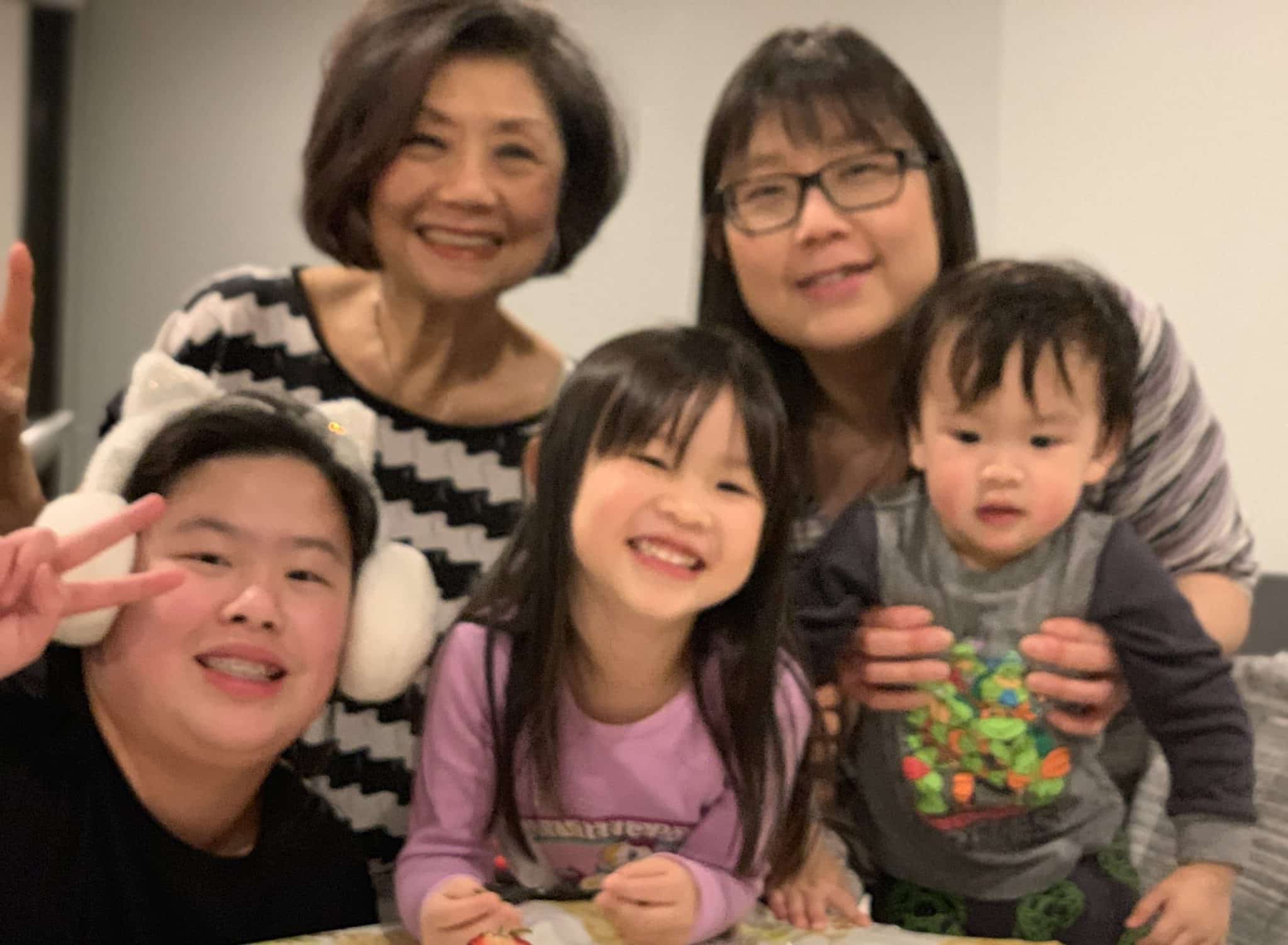
“Set free”: Ong enjoys a close relationship with her daughter, pictured here alongside Ong’s three grandchildren in Sydney in 2019.
When she was young, she used to be terrified of me. As a result, our relationship was strained during her growing up years.
As a young adult, she once became so angry at me that she threw a clothes hanger directly at me. The hanger missed its target, and I picked up the hanger as if nothing had happened.
Just as I had experienced a deep emotional release from surfacing my hidden emotion to my mother, I also gave my daughter the grace she needed to be ‘set free’, even if it came in the form of a flying hanger.
Today, we enjoy a close relationship, even though she is living with her family in Melbourne, Australia.
This book is written by Ong-Ang Ai Boon and Salt&Light Senior Writer, Janice Tai. Proceeds of the book will go to Salt&Light and other Christian ministries. You may purchase a copy of the book at SKS Books at Tan Boon Liat Building, World Scientific or Amazon.

Newly launched book, “It’s Not Me”, chronicles tales of faith in the workplace and beyond.
RELATED STORIES:
https://saltandlight.sg/work/how-a-near-death-experience-shaped-an-office-terror/
We are an independent, non-profit organisation that relies on the generosity of our readers, such as yourself, to continue serving the kingdom. Every dollar donated goes directly back into our editorial coverage.
Would you consider partnering with us in our kingdom work by supporting us financially, either as a one-off donation, or a recurring pledge?
Support Salt&Light